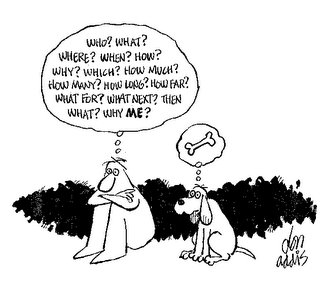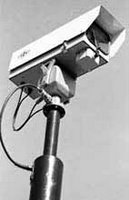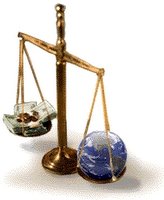
To me, perhaps the greatest mysteries concern
consciousness. For example, I wonder if, perhaps, consciousness is the bridge between the physical and the spiritual.
Consciousness is wrapped up in concepts like the
mind and
self awareness. On this last point, various questions arise. Why are humans self aware? To what extent are animals (like the dog in the cartoon above) self aware? Can computers
become self aware? (Assuming they're not already!)
I recently rented
A.I. Artificial Intelligence, a 2001 movie directed by Stephen Spielberg and based on ideas by Stanley Kubrick. I have to say that I was disappointed. Although aspects of the movie were quite impressive, it didn't give me much to chew on.
So once again, I appeal to you, gentle readers for enlightenment, or at least some opinions!
Update 14Feb2006: After writing this post, a friend suggested that I look at work by Karl Pribram, an eminent brain/behaviour researcher. So I sent Professor Pribram an e-mail — and he very kindly
sent me one of his recent papers! The paper, titled "Consciousness Reassessed", is heady stuff (pun intended, tee hee): it touches on neurophysiology, perceptual psychology, quantum physics, coding theory, and philosophy.
Along the way Pribram cites related work by all kinds of luminaries: Russell, Bohr, Poppper, and Crick to name a few. Yes,
Francis Crick, who later in life turned his attention from DNA to neuroscience. In 1994, he published a book titled
The Astonishing Hypothesis: The Scientific Search for the Soul, which Pribram characterizes as taking "an eliminative reductionist, materialist stance". Pribram writes:
"Many of the problems that fuel the current discourse on consciousness are due to the acceptance of a radical reductionist stance. Take Francis Crick’s view (Crick 1994) that if we knew what every neuron is doing we would dispense with folk psychology. But what every neuron is doing is a complex process composed of synapto-dendritic fine fibered transactions, circuits, modules composed of circuits and systems composed of modules. The complexity of our experience can also be hierarchically organized into levels of organization, scales of processing, that must be taken into account if we are to relate the organization of our experience to the organization of the brain (see, for instance, King and Pribram 1995)."
(That last reference is to a book with the engaging title
Scale in Conscious Experience: Is the Brain Too Important to be Left to Specialists to Study?)
Crick's book does sound interesting, though. At Amazon they let you see the first four pages. It starts with a quote from the Roman Catholic catechism:
Q: What is the soul?
A: The soul is a living being* without a body, having reason and free will.
The asterisk is Crick's. In the footnote he writes:
"As a small child my wife, Odile, was taught the catechism by an elderly Irish lady who pronounced "being" as "be-in'". Odile heard this as "bean." She was extremely puzzled by the idea of the soul of a living bean without a body but kept her worries to herself."
 Update: 18Feb2006
Update: 18Feb2006: In the comments, Mike points out that a sense of humour may be related to consciousness. It's an interesting point. In science fiction movies, robots are often portrayed as being humourless. Consider, for instance, the android
Data on
Star Trek: The Next Generation.
Here is an article on the neurology of humour. And I wonder if any of this has to do with
mirror neurons, about which there's been quite a bit of excitement lately.






